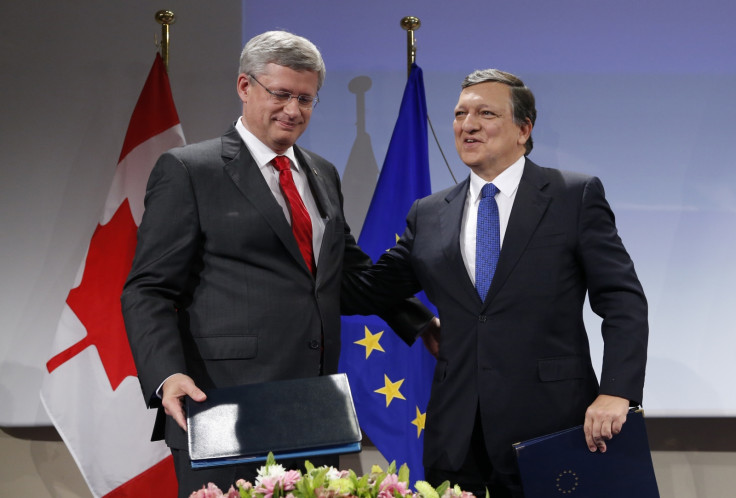EU-Canadian Free Trade Agreement Close Despite Political and Public Opposition

The deadline for amendments to the free trade agreement between the European Union (EU) and Canada closed today (12 September), as opponents criticised the process for being "undemocratic".
The Comprehensive Economic and Trade Agreement (CETA) was agreed in principle in October 2013 and been in the works for five years. Its 1,500 page manuscript was finalised in August, with the treaty set to be ratified within two years.
Officials from both sides are set to sign the document on 26 September, after which it will be issued to member state parliaments who are free to debate it, but not to make amendments.
It will be voted upon by the European Parliament, but again, MEPs will not be able to suggest amendments, simply vote for or against the agreement. It is understood that neither MPs nor MEPs have seen the text. If the UK's Trade Minister Lord Livingston wishes to see the text, he must go to a private room to view the documents, without making any copies.
While some estimate that bilateral trade could be boosted by up to 20% and could be worth a combined $20bn to the respective economies, others have questioned the fact that parliamentarians have not been privy to negotiations and will only get to vote on the final text, agreed, essentially, behind closed doors.
The Labour MP Geraint Davies told IBTimes UK that he would be encouraging his party colleagues in Strasbourg to vote against an agreement which "could come back and haunt them".
Referring to the ongoing discussions over the Transatlantic Trade and Investment Partnership (TTIP) between the EU and US, which has been subject to widespread protests and media coverage, he said: "We've been trying to protect the front door, but left the back door wide open. All these global companies can access their entry point to the European market through a Canadian portal.
"We want to see more trade and growth, but there's not enough information to support this, and enough information to hold off from the brink."
Davies plans to raise a private members bill in parliament calling for more scrutiny and public debate over free trade agreements that affect the UK. As a member of the Council of Europe and the European Scrutiny Committee, Davies said he has already raised his concerned and floated various motions for more transparency.
ISDS
Leaked documents show that CETA contains the controversial investor-state dispute settlement clause (ISDS) which has caused so much consternation in TTIP negotiations. ISDS is a commonplace mechanism of free trade agreements, which grants a foreign investor the right to initiate dispute settlement proceedings against a foreign government, pending the results of a public consultation.
Recently, the German press reported that Berlin was threatening to derail CETA over the controversial investor-state dispute settlement (ISDS) clause, which Germany forced EU negotiators to remove from the negotiating table in the EU-US discussions over the Transatlantic Trade and Investment Partnership (TTIP).
It would seem that some common ground was brokered, but NGOs have called for the agreement to be shelved until the European Commission publishes the results of its analysis of a public consultation into ISDS in TTIP, which took place earlier this year.
After strong objections from Germany and from the general public, the outgoing Trade Commissioner Karel De Gucht removed ISDS from the TTIP negotiations pending the public consultation, which attracted more than 150,000 submissions from across Europe, mainly from the general public.
Geraint Davies said: "Global companies that trade with Britain and the EU will be able to exercise intimidation and to sue governments for the loss of profits. It's seen around the world: big companies are able and prepared to sue governments. Philip Morris has already sued Australia and Uruguay over plain packaging of cigarettes."
Nick Dearden, director of the World Development Movement called CETA a "Trojan horse" for TTIP and urged the EU to await the results of its analysis before proceeding with signing the final document.
He told IBTimes UK: "It's absolutely unbelievable. They say they've had input on the trade committees being briefed on the situation from the trade commissioner. But MEPs or national MPs still haven't seen the text. The input they've had has been completely without text or mandate for negotiations. It's in its final form the first time they see it."
Petition Rejected
Meanwhile, the European Commission has rejected a proposal from a coalition of more than 200 trade unions, NGOs and watchdogs from across Europe to hold a hearing in order to force it to review policy on free trade agreements.
Under the European Citizens' Initiative, citizens have formal petitioning rights over decisions made by the European Commission, should they gather one million signatures from seven or more EU states. In such cases, the commission would hold a public hearing in the European Parliament.
In response to the petition, the commission issued the following statement: "The negotiation of an international agreement precedes and prepares its signature and conclusion. The council decision authorising the opening of negotiations is therefore a preparatory act with respect to the council decisions authorising the signature and conclusion of an international agreement, which are adopted on the basis of commission proposals. As such, it deploys legal effects only between the institutions concerned without modifying EU law. Such modification occurs only once the result of the negotiations, i.e. the international agreement, is signed and concluded."
Opponents of CETA and TTIP are today (September 12) protesting outside the Department of Business Innovation and Skills in an effort to put pressure on Business Secretary Vince Cable to withdraw support for the agreements.
© Copyright IBTimes 2025. All rights reserved.






















